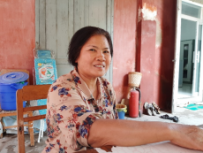
Interview With Han Khom

Han Khom recounts her life under the Khmer Rouge regime.
Born around 1959 in the Sma Puon Village of Kandal District, Han Khom experienced the Khmer Rouge’s takeover of her native village when she was in third grade. Her family moved to Kan Thom District, which was a Khmer-controlled evacuation zone, where they lived for three years under the Khmer Rouge government which rose to power on 17 April 1975. There was no formal school in this evacuation zone, but she had informal lessons with a teacher under a tree. After class, the teacher would bring the students out to the rice field to catch rats for food, while her parents gathered edible plants. Han Khom eventually worked for the Khmer Rouge authorities inspecting city dwellers fleeing to the countryside for any valuables they might be carrying, and to advise them not to flee south to Vietnam. Later, she was assigned to the mobile unit team that was deployed away from her home, and she could not contact her parents
Han Khom does not remember what year she was born, but she said that she is now 60 years old. However, not remembering the year shewas born is not uncommon in Cambodian culture. She did not remember what year he started school either. She was born at Sma Puon village, Choeung Keub Commune, Kandal Stung District, Kandal Province. It is about 20 kilometers at the south of Phnom Penh.
Three years after she started school, the revolutionary soldiers (Khmer Rouge communist soldiers) captured her home village. She, along with her mother and other siblings, was abruptly evacuated to the southern part of Cambodia in Koh Thom district, Kandal province, about 20 km from Vietnamese border. That area was the Khmer Rouge communist liberated zone. Her father, who was drunk on that day, did not go with the family, but he followed them few days later. Almost all people in her village and neighboring village were evacuated.
In Koh Thom district, under the revolutionary control, She and her family were placed to stay in the abandoned house, while other villagers settled with other villagers. The owners of the house lived upstairs, the evacuees lived downstairs.
she was allowed to attend an informal classroom, which was arranged under the tree. It was not a well-organized classroom and not a formal education either.
Most of the time, the after the class ended, the teacher brought a group of students to catch rats in the rice field for food. Her parents’ main duty was to pick up corns and other kinds of fruit and vegetable because it was the fertile area where lots of fruit and vegetable were grown.
She lived there for about three years when the Khmer Rouge communist group took over the country on 17 April 1975. When the Khmer Rouge took over the country, Khom was at Koh Thom district. City dwellers were evacuated from Phnom Penh and other towns to the countryside. Khom recalled seeing lots of people being evacuated from the cities and towns. She was instructed by the revolutionary soldiers to check and inspect those city dwellers in case they brought some valuable objects from their home and hid them in the pocket or suitcases. Also, Khom’s duty was to tell those city dwellers not to go down South as the Khmer Rouge concerned that those people would flee to Vietnam.
Then, after the evacuation of people from the cities and town was over, she was assigned to work in the mobile unit team, in which the members consisted of unmarried men and women. That team was considered the strongest team who were assigned to work away from their houses for a specfict period of time. Visiting parents at home was strictly prohibited. At home, her parents were assigned to do other tasks with limited food to eat.
Interviewer: Socheat Nhean
Interviewee: Han Khom
Transcript Notes
None
How does Han Khom’s experience challenge the traditional characterization of the Khmer regime and enhance our understanding of life under the Khmer Rouge?
Consider the role of constant, forced movement in shaping the Cold War experience for Han Khom and other Cambodian civilians.